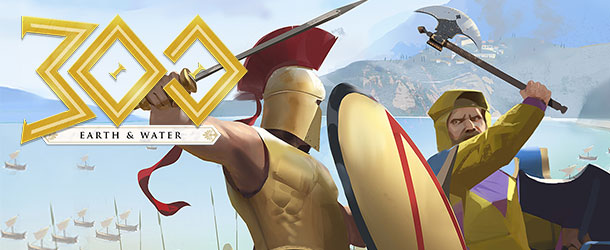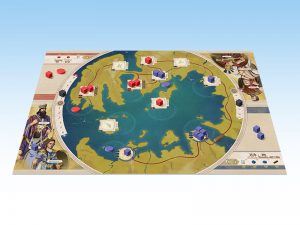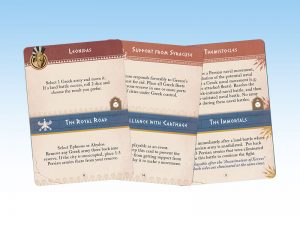300: Earth & Water, the strategy game for two players published by Nuts Publishing, will be soon available in US stores, distributed by Ares Games. To get ready for its arrival, here we present an overview of the game, originally published in the issue #255 of Game Trade Magazine:
More than a century ago the Persians shook off the rule of their Median overlords. Decades later, Cyrus the Great rapidly extended his new empire in every direction. In Asia Minor, his conquest of Lydia brought the Persians into contact with the Greek colonies of Ionia. Now, at the turn of the 5th century BCE, the Greek cities of the region have risen up against the tyrants imposed on them by the Persians. They call for help from the cities of Greece, but only Athens and Eretria send reinforcements. The Persian king, Darius I, responds and, within five years, the Persian army and fleet snuff out the last flames of resistance. Darius vows to punish those who aided the rebellion and conquer the whole of Greece. The stage is set for 50 years of conflict between the Greeks and Persians.
300: Earth & Water is a strategy game for two players, designed by Yasushi Nakaguro and developed by Nuts! Publishing, and its English edition is distributed by Ares Games in North America. Yasushi Nakaguro is a Japanese game designer and magazine editor, with an impressive back catalog of acclaimed self-published historical games. 300: Earth & Water is the first of his games available in an all-new edition with glorious artwork and top-quality components.
In 300: Earth & Water, one player takes the role of the Persians, leading a succession of campaigns to conquer the cities of Greece, while the other player leads the Greek navy and army, assembled in Athens and Sparta, in an effort to resist the invaders at all costs.
The Persians begin the game in control of the cities of Ephesos and Abydos in Asia Minor, they have an abundance of resources and seemingly limitless reserves of manpower. The Greeks face them across the Aegean Sea, with smaller armies composed of elite troops, and superior naval forces. At the start of every campaign, the Persian player must prepare, spending talents (the currency of the ancient world) to raise armies and fleets, and maybe even constructing a pontoon bridge across the Hellespont, so that their armies can march into Greece. But if Darius dies suddenly of illness, or his successor Xerxes is assassinated, then the campaign is abandoned before it begins, and preparations must begin anew. If fortune smiles kindly on the Persian leader, the Greek player in turn must prepare for the defense of Greece. The Greeks have far less resources available but may construct fleets more easily and can rely on the superior ability of their forces.
During their preparations, the players also purchase cards, and it is these which drive the game. On their turn, a player may discard a card to move armies or fleets across the map. If a city is undefended, then it is easily captured, but if there are enemy forces then there will be a naval or land battle, or even both. The battles are resolved through a simple but ingenious system, where a die is rolled for every unit, but only the highest roll counts.
The Persians will likely have more armies or fleets, but they are less effective than their Greek counterparts, and so a small Greek force may be able to hold out against more numerous Persians. Rather than discarding a card, a player may play it for an event. Players draw from a common deck of cards, but each card has both a Greek and a Persian event. While the Greek player may be able to refight the famous battle of Thermopylae through play of “300 Spartans” or call on aid from “Artemisia I” the queen of Halicarnassus, the Persians may set the “Acropolis on Fire” or conquer a neutral city and demand a “Tribute of Earth and Water”.
At the end of each campaign, both players must supply their forces across the map. The Persians will have to rely on their fleets for this, unless they have built the pontoon bridge. Then control of cities is tallied. If either player has captured both of the major cities that form their opponent’s main bases, then they gain an automatic victory. Otherwise, if either player controls more cities than the other, the score marker is advanced in their favor. But even a convincing lead can be lost during the next campaign, thanks to clever strategy, unexpected events, and the caprices of fortune.
In 300: Earth & Water, you can recreate the most exciting events across five decades of ancient history in only half an hour of playing time. Be the master of land and sea!












Follow Us on